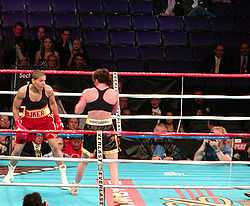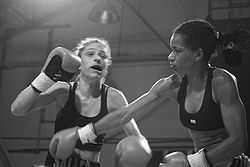Women's boxing

Women's boxing first appeared in the Olympic Games at a demonstration bout in 1904. For most of the twentieth century, however, it was banned in most nations. Its revival was pioneered by the Swedish Amateur Boxing Association, which sanctioned events for women in 1988. The British Amateur Boxing Association sanctioned its first boxing competition for women in 1997. The first event was to be between two thirteen-year-olds, but one of the boxers withdrew because of hostile media attention. Four weeks later, an event was held between two sixteen-year-olds. The A.I.B.A. accepted new rules for Women's Boxing at the end of the 20th century and approved the first European Cup for Women in 1999 and the first World Championship for women in 2001.
Women's boxing was not featured at the 2008 Olympics; however, on 14 August 2009, it was announced that the International Olympic Committee’s Executive Board (EB) had approved the inclusion of women’s boxing for the Games in London in the 2012 Olympics,[1] contrary to the expectations of some observers.[2] Although women fought professionally in many countries, in the United Kingdom the B.B.B.C. refused to issue licences to women until 1998. By the end of the century, however, they had issued five such licenses. The first sanctioned bout between women was in November 1998 at Streatham in London, between Jane Couch and Simona Lukic.

History in the US
During the 1970s, a popular female boxer named Cathy 'Cat' Davis came out of the United States Northwest, and a few of her fights were televised. To this day, she remains the only female boxer to appear on the cover of Ring Magazine. But a scandal broke out where it was said that some of her fights had been fixed.
During the 1980s, women's boxing briefly resurfaced in California under the wings of sisters Dora and Cora Webber. The twin sisters were world champions and packed crunching punching power and a good chin.
But the boom of women's boxing came during the 1990s, coinciding with the boom in professional women sports leagues such as the WNBA and WUSA, and with boxers such as Stephanie Jaramillo Delia 'Chikita' Gonzalez, Laura Serrano, Christy Martin, Deirdre Gogarty, Laila Ali, Jackie Frazier-Lyde, Lucia Rijker, Ada Vélez, Ivonne Caples, Bonnie Canino and Sumya Anani, all world champions, jumping into the scene.
Women's boxing has experienced more television and media exposure, including the major motion picture Million Dollar Baby. There are a few organizations that recognize world championship bouts, and fights are held in more than 100 countries.
On 16 April 1992, after eight years in court in Massachusetts, Gail Grandchamp of North Adams, Massachusetts won her battle to become a boxer, as a state Superior Court judge ruled it was illegal to deny someone a chance to box based on gender. During her battle to win the right to box as an amateur, she passed the age of 36, the maximum age for amateur fighters. Even though she knew it would not help her as an amateur, Grandchamp continued her efforts, and eventually did box professionally for a time.
International Olympic Committee (IOC) president Jacques Rogge announced that it would be an Olympic sport at the 2012 Games in London.
Professional weight divisions

- Pinweight: up to 101 pounds
- Light Flyweight: 106
- Flyweight: 110
- Light Bantamweight: 114
- Bantamweight: 119
- Featherweight: 125
- Lightweight: 132
- Light Welterweight: 138
- Welterweight: 145
- Light Middleweight: 154
- Middleweight: 165
- Light Heavyweight: 176
- Heavyweight: over 189
Amateur weight divisions
- Pinweight: 44–46 kg/97lbs-101
- Light Flyweight: 46–48 kg/ 102–106 lbs
- Flyweight: 48–51 kg/ 103–112 lbs
- Bantamweight: 51–54 kg/ 114–119 lbs
- Featherweight: 54–57 kg/ 120–125 lbs
- Lightweight: 57–60 kg/ 125–132 lbs
- Light Welterweight: 60–64 kg/ 133–141 lbs
- Welterweight: 64–69 kg/ 142–152 lbs
- Middleweight: 69–75 kg/ 153–165 lbs
- Light Heavyweight: 75–81 kg/ 166–178 lbs
- Heavyweight: 81 kg+/ 178 +
European championship women boxing 2011
In October 2011 the 2011 Women's European Union Amateur Boxing Championships were held in Rotterdam, The Netherlands.
See also
- Kick boxing
Movie
- Blonde Fist (1991)
- Girlfight (2000)
- Die Boxerin' (2004)[3]
- Million Dollar Baby (2004)
- Dans Les Cordes (2004) (remade in English as On the Ropes, in 2007)[4]
- "Punch Like A Girl" (2008), six part documentary series on amateur women's boxing in Canada, produced and directed by Maya Gallus and Justine Pimlott, "Red Queen Productions".
References
- ↑ Women’s boxing for 2012 and golf and rugby proposed for 2016, Official Website of the Olympic Movement
- ↑ Andrew Eisele (2006). Women's Boxing, About.com
- ↑ Die Boxerin. IMDb. 2004.
- ↑ Dans Les Cordes (On the Ropes). IMDb. 2004 in French, 2007 in English.
External links
| ||||||||||||||||||||||
| ||||||||||||||||||||||||
| Wikimedia Commons has media related to Women's boxing. |